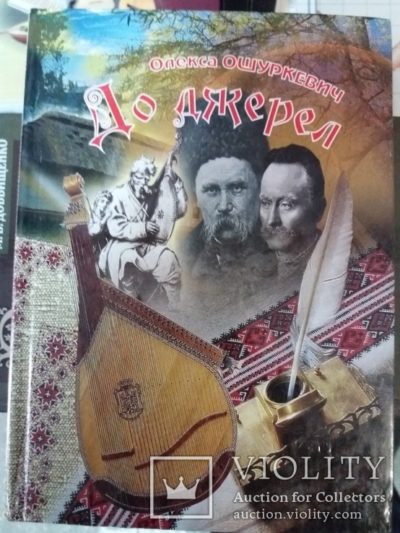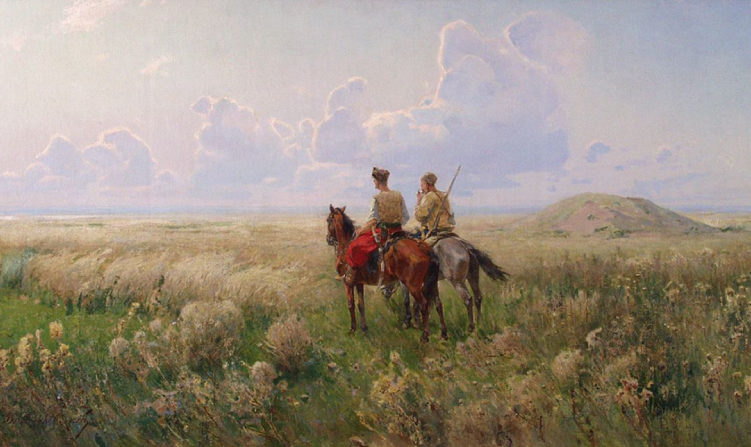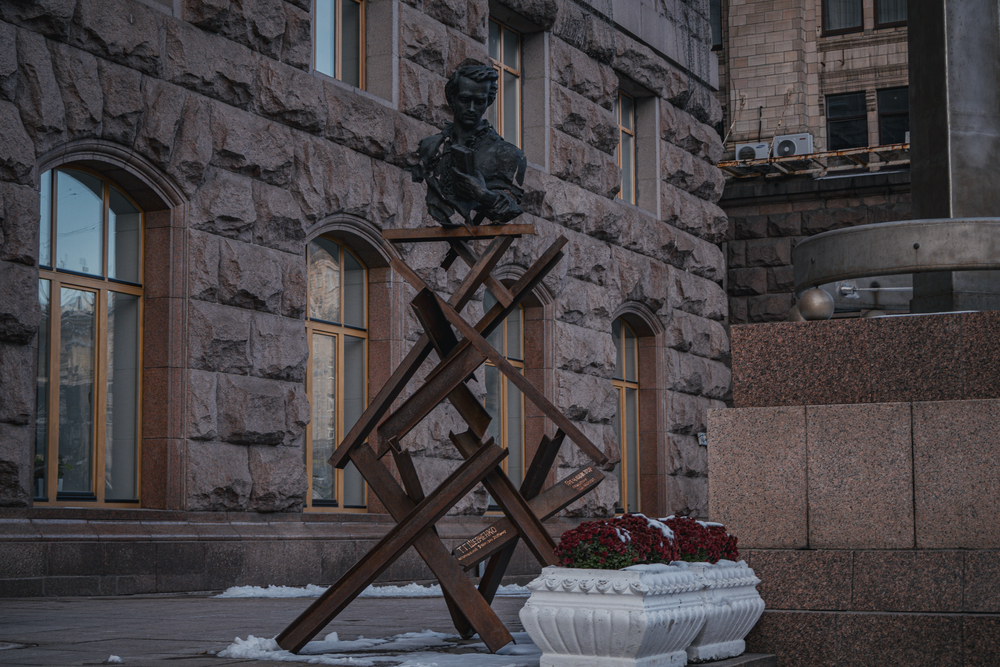I first visited Ukraine, a country I had always thought of as my country, in 1992 after my Aunt had returned from Komi in North Russia to her homeland. It was very different from the country of my Ukrainian textbooks, with a Cossack astride a rearing horse on the front cover or Ivan Franko and Taras Shevchenko staring sombrely at the reader.

The Ukrainian nationals on the flight were at the back of the plane. I was near the front, my Saturday School Ukrainian, which I had learned badly, inadequate for communication. My supposedly fellow Ukrainians were foreign to me, and I to them.
After we landed, I found a bookshop that had no Ukrainian books at all. I asked where they were. There was an empty bookshelf labeled Ukrainian literature behind a cord to stop readers from approaching.
It was a perfect metaphor for Ukraine’s literary situation, a literature that was both invisible and shunned. I have recounted this story elsewhere, but it needs to be remembered. Ukraine was so thoroughly genocided that its capital became an instrument of its erasure.
I started reading a lot more after that. The experience above sounds silly, perhaps, but it was one of many tiny humiliations that made me identify ever more strongly as Ukrainian. I focused on writers like Pavlo Tychyna and Vasyl Stus, who had been crushed by repression, murdered by the state, or brutalized.
The first difficulty you encounter as a Ukrainian literary translator is that everyone knows about Ukraine: Russia and Russians have told them what it is.
The first difficulty you encounter as a Ukrainian literary translator is that everyone knows about Ukraine: Russia and Russians have told them what it is. Ukrainian voices are being heard more clearly now, but in the 90’s, Russian soft power had shaped perceptions globally. Why was I translating Ukrainian and not Russian? Wasn’t Ukraine part of Russia? These are just some of the responses I received.
The next problem was the grammatical and cultural difference between English and Ukrainian poetry. Ukrainian poetry has various emotions and images that really cannot be conveyed in English. A child like rapture with nature, the power of the Cossack myth, the image of the Steppe. The language has numerous cases and verb conjugations that allow pronouns to be dispensed with. There are far more abundant possibilities for rhyme… fitting this poetry into a receptacle, an English version, was like trying to nail jelly to the wall.

I had always dreamed of being a poet and was familiar with Robert Lowell’s controversial translations of Russian poetry, which treated the original text as a departure for an English poem that often traveled far from the original.
In his posthumous tribute to Lowell, Seamus Heaney said that he “Englished Russian,” and this was more too of him than any other renderer of poetry into English. The original version was arguably lost in many respects, but what survived was a thing of beauty. He had opened up a new audience for this poetry. He also reinforced the myth of Russian poetry that remains part of its appeal and is linked to Russia’s horrible erasure of “inferior” cultures.
I knew that I would have to craft English language versions of the Ukrainian poets that worked as poems in English, and I also understood that it was important to reach a new audience.
For Russians, good or bad, the war and Ukraine are usually all about them. That is why now, more than ever, we must work to recover Ukrainian culture as a whole from its marginalization.
Ukrainian literature was, with some exceptions, a minority interest, its image shaped by Russia. Martin Seymour-Smith, in his terribly imperialist guide to world literature, consigned it to the ranks of the minor literatures.
When I read his account of Ukrainian literature, it contained factual errors, such as describing Solar Clarinets, Tychyna’s great work, as depicting a revolution in heaven.
Nope. He hadn’t read it properly.
My translations of Ukrainian poetry appeared in journals where Ukrainian poetry had never featured before, such as Poetry Salzburg Review, or where it had only rarely appeared, notably Modern Poetry in Translation.
I was particularly proud that a review of the latter journal in which some of my Tychyna translations appeared singled them out for praise, particularly since they appeared alongside Latin translations by Seamus Heaney.
I crafted different voices for the poets I translated, like the Eliot character referred to in the title, building them as an English character that conveyed their spirit into English. I wrote articles that focused on telling the story of Ukrainian literature and how it was written by people who rebelled against the empire and died for the sake of sonnets and the language that was the tool of their art.
Ultimately, I won two awards from English PEN and drafted a creative writing course for The Poetry School, Britain’s largest online poetry educator.
I also curated a series of Ukrainian poets in translation, Stanzas for Ukraine, which was published on the Poetry School site.
The articles that follow are reproductions of the “lessons” for my creative writing course. They include translated poems and a writing exercise. I am hoping that they pique your interest in Ukrainian poetry in translation and stress that now, more than ever, championing Ukrainian literature is vital for combatting Russia’s genocide of Ukraine.
These writers, too, strip the myths away from Russia and show that country for what it is: a predatory empire built on the blood of its subject peoples.
There is a risk after this war that it will one day be told as a tale of Russian suffering and heroism, much as happened with the Ukrainian War of Independence last century.
These poets and their stories are a refreshing antidote to the myth of Russian culture, which has stifled vast swathes of Eurasia, bringing death in its wake.
For Russians, good or bad, the war and Ukraine are usually all about them. That is why now, more than ever, we must work to recover Ukrainian culture as a whole from its marginalization.
These poets and their stories are a refreshing antidote to the myth of Russian culture, which has stifled vast swathes of Eurasia, bringing death in its wake.
They will break and heal your heart again and make you hear birdsong with new clarity.
What else is poetry for?
`
`
`
`
`
Steve Komarnyckyj’s articles:
- Poetry on fire: a personal journey through Ukraine’s Executed Renaissance
- A taste of Ukraine’s poetic Renaissance executed by Stalin
- Ukrainian translations, Russian oppression, and soft power
- “Rebellious pagan” Ukrainian poet Antonych receives English translation
- Ukraine’s Executed Renaissance and a kickstarter for one of its modern successors


